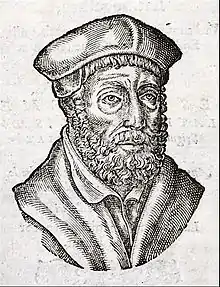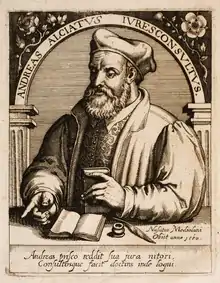Andrea Alciato
Andrea Alciato (8 May 1492 – 12 January 1550),[1] commonly known as Alciati (Andreas Alciatus), was an Italian jurist and writer.[2] He is regarded as the founder of the French school of legal humanists.


Biography
Alciati was born in Alzate Brianza, near Milan, and settled in France in the early 16th century. He displayed great literary skill in his exposition of the laws, and was one of the first to interpret the civil law by the history, languages and literature of antiquity, and to substitute original research for the servile interpretations of the glossators.[3] He published many legal works, and some annotations on Tacitus and accumulated a sylloge of Roman inscriptions from Milan and its territories, as part of his preparation for his history of Milan, written in 1504–05.[4]
Alciati is most famous for his Emblemata, published in dozens of editions from 1531 onward. This collection of short Latin verse texts and accompanying woodcuts created an entire European genre, the emblem book, which attained enormous popularity in continental Europe and Great Britain.
Works

- Annotationes in tres libros Codicis (1515)
- Emblematum libellus (1531)
- De ponderibus et mensuris (in Latin). Venezia: Melchiorre Sessa. 1532.
- Opera omnia (Basel 1546–49)
- Rerum Patriae, seu Historiae Mediolanensis, Libri IV (Milan, 1625) a history of Milan, written in 1504–05.
- De formula Romani Imperii (Basilae: Ioannem Oporinum, 1559, editio princeps)[5]
- In Digestorum titulos aliquot commentaria (in Latin). 1. Lyon: Compagnie des libraires. 1560.
 De ponderibus et mensuris, 1532
De ponderibus et mensuris, 1532 In Digestorum titulos aliquot commentaria, 1560
In Digestorum titulos aliquot commentaria, 1560
Quotation
Plenitudo potestatis nihil aliud est quam violentia.[6]
References
- Bregman, Alvan (2007). Emblemata: The emblem books of Andrea Alciato. Newtown, Pa: Bird & Bull Press.
- D. Bianchi, 1913. "L'opera letteraria e storica di Andrea Alciato", Archivio storico lombardo, 4th series 20:47–57.
-
 One or more of the preceding sentences incorporates text from a publication now in the public domain: Chisholm, Hugh, ed. (1911). "Alciati, Andrea". Encyclopædia Britannica. 1 (11th ed.). Cambridge University Press. p. 522.
One or more of the preceding sentences incorporates text from a publication now in the public domain: Chisholm, Hugh, ed. (1911). "Alciati, Andrea". Encyclopædia Britannica. 1 (11th ed.). Cambridge University Press. p. 522. - Roberto Weiss, 1969. The Renaissance Discovery of Antiquity, pp 152f.
- https://opac.vatlib.it/stp/detail/10416314
- "Plenitude of power is nothing else than violence." Responsum Bk 5, 23
External links
| Wikimedia Commons has media related to Andrea Alciato. |
- Phillipson, Coleman (1913). "Andrea Alciati and his predecessors". In Macdonell, John; Manson, Edward William Donoghue (eds.). Great Jurists of the World. London: John Murray. pp. 58–82. Retrieved 9 March 2019 – via Internet Archive.
- Alciato at Glasgow – Reproductions of 22 editions of Alciato's emblems from 1531 to 1621
- Description, Reproduction and translation Memorial University of Newfoundland
- Emblemata Latin text, Antwerp 1577, full digital facsimile, CAMENA Project